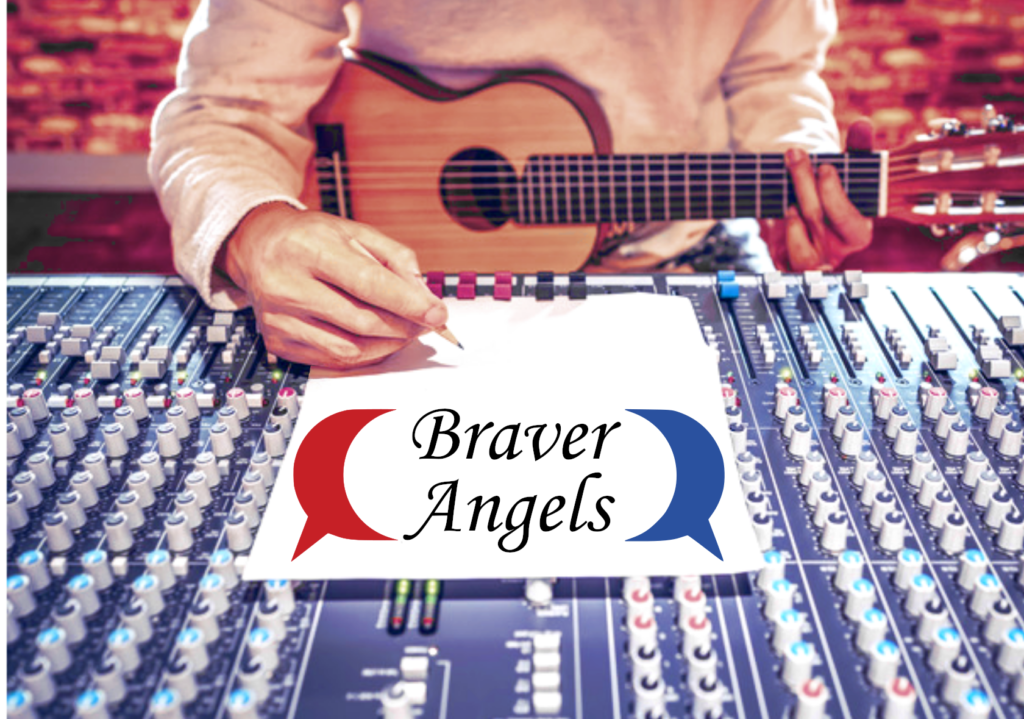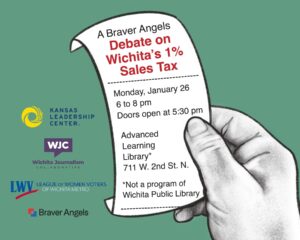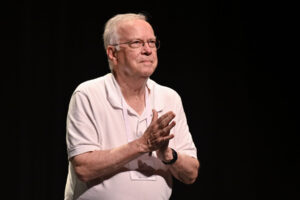This article is the first of a series in which Red and Blue members of Braver Angels discuss selected submissions from our Songwriting Contest together.
Before starting, we want to thank all the Braver Angels songwriters who’ve sent us our first submissions! Sharing your political and musical ideas takes courage, and we’re grateful you’ve given us the chance to hear your voices. We’re accepting submissions through July 4th.
For this conversation, the Blue is Sage Snider—a singer, dancer, songwriter, and pirate musician in Nashville, Tennessee. The Red is Ronni Lynn Smith—singer, songwriter, and pianist from Waynesville, Ohio. Sage and Ronni met at Braver Angels’s first National Convention in 2018, and have been playing together and talking music ever since.
—-
Ronni: Let’s start with something uplifting: “Make America Good Again” (Lyrics by Beth Blatt , music by Derek Gregor, vocals by Jake McKenna, Michael Shofi on guitar.)
Make America Good Again – live at the Bitter End
Sage: I think my favorite part of this song is that it’s really catchy and inspiring. So even though I know I should analyze the lyrics and criticize the arguments, I can’t help but feel inspired to “make America good!”
R: It’s like, the message in the song is too positive to even try to argue. I think the lyrics are so relatable. Because we all want the same things: peace, justice, love… who doesn’t want that?
S: But I think the most relatable thing is that he starts with “I” statements—really specific, relatable observations. First, he talks about his experiences. I’m scared, feeling hopeless, can’t read the paper; he observes himself and is humble and self-critical, and is also observant about the world.
R: Plus, it’s not just “I’m sad and terrible things are happening,” but there’s light at the end of the tunnel.
S: And that light is—he says at the end—that based on these observations, he’s gonna do something.
R: Right, let’s make a change.
S: listening, opening a door.
R: Oh yeah, my second-favorite line is “open up a door; the wall between me and you.” I just picture a wall with a door, and all it takes to open the door is knock and say: “Hey, do you wanna talk about this?” instead of drowning each other out with our music, opinions, beliefs, or what have you.
S: To me, doors and walls are kind of cliché imagery, and I know this is a cliché too, but I like the line to make the golden rule our song.
R: That was my first-favorite line!
S: Oh, so we’re totally on the same page! It’s a little cliché too, but maybe that’s the point—just being “good is divine.” The song makes just being good—the word “good”—seem grand.
R: I think he’s trying to convey that ‘great’ is like, you’re #1, you won the race, you’re a superstar, you’re the best of the best. ‘Good’ is like, you don’t have to win the race, but you have a good heart, good intention, you know the difference between right and wrong.
S: So it’s better, harder, and braver to be good than to be great. I also think that is clearly a criticism of Trump. I’ve heard liberals say it as veiled criticism before, “Make America Good Again.” What do you think about that? Do you sympathize with the slogan, “Make America Great Again”?
R: I sympathize with both. I know Trump is extremely bold; he just really voices his opinions no matter how vulgar, or how much backlash he might get, which he has done over and over again. So on the one hand, I think being bold and sharing your opinion is good, so you don’t lose your individuality and try to appease other people so much that you become somebody you don’t want to be. But also, you don’t want to offend everybody and lose your sense of values. I like the message of being both great and good—if we could be confident in our individuality and have freedom in being bold, but also good, in the sense of mindfulness of others. I’m not sure what to make of the “again” part.
S: I guess the “again” part isn’t really explained in this song. There’s no reference to a past where we did act like this. The reason I can relate to the song is because of the uplifting and optimistic chorus. “Make America Good,” we can do this. But I read that as the future, even though it has the word “again.” There’s nothing in the song that makes me feel like we ever were this good in the past; it’s just a wordplay.
R: It could be addressing how we now feel scared and angry, and it’s saying, ‘let’s get happy again, let’s find justice again, let’s feel good again.’
S: I see, but I don’t want it to be like “let’s feel like we’re good again,” if we never were good before.
R: Right, you’ve got to know that what you’re doing is right. If we don’t see a change, then something’s going on we’ve got to fix.
S: So let’s listen to some songs about change! “Close to You” by Amanda Spinella, who wrote this while her aunt was “declining, eventually passing, due to Covid-19.”
S: That is so beautiful.
R: Yeah, it’s so sincere, touching, personal; she’s singing about something that she really went through, that thousands, hundreds of thousands of people have been going through.
S: I think she exemplifies somebody trying to show love, and be a listener, and be close to people—even at a time in our country when it’s scary and hard to feel close to other people, the virus making that a literal scenario. She’s trying to make a phone call and communicate with someone who is dying. But it also has this bigger meaning of this virus showing us some essence of all our lives—that even when this virus isn’t happening, all that really matters is that we need to be close to each other and support each other and communicate. And that’s more important than the fear and worry and sadness and even the death.
R: And for her to pull herself together enough to write this song, coming out of such a hard time—to turn it around and make it inspirational, to turn it into something that can help other people going through it…
I really like how the lyrics change towards the end chorus. At first she says, “the change is coming like it always does.” Then it becomes, “the change is already here.” She’s saying this is happening, not ‘I hope for change’ or ‘I wish for change.’ And whatever that change is, the song gives so much faith and encouragement to anyone struggling; it’s enough to be close to each other, to be with each other.
S: I was fixated on figuring out what the change that she’s talking about is. It seems like two things—this horrible virus that has divided us and is killing people, that’s a change. But there’s also this change in her, of thinking about how much she cares about her aunt, or whoever this song is to, and she feels closer to them and realizes how important it is to try to be close to somebody.
That’s a change—the realization of the importance of listening, and of expressing our love towards each other. And maybe that’s a change the virus has brought. I don’t know which is the stronger or more lasting change, but that tension of questioning what is the change that’s gonna happen, because change is inevitably happening in our world—that’s a central question for me in this song.
R: And with the coronavirus, that’s something out of our control. It’s just something that hit everyone and is affecting everyone, so in a way this change could force us to come together and to communicate better.
I might be thinking of The Wave, actually.
S: Yeah, let’s move on to “The Wave,” by Abigayle Kompst.
R: This song is stupid because it makes me emotional!
S: That was a great Braver Angels statement!
R: Haha! What I mean is, why are we fighting and crying all the time, let’s just hug and cry instead!
S: Yeah, I think some of this song is saying, ‘we’re all going through this horrible thing together, and that will bring us together.’
R: I love this line: “We’re in the water, poison in our mouths and all of our senses.” That makes me think of when we are afraid, we are in such a different state, in another world, wrapped up in worry and doubt, and in that state we can make unconscious choices that aren’t even us, or what we truly believe in.
S: Yeah, and she’s using a natural metaphor—a wave, we’re living underwater. There’s probably a lot of ways we can read this. But that metaphor makes this song hopeful, because it doesn’t matter who started this—the wave just happened, and it’s making us live like we’re in these underwater houses, and seeing the world differently. Maybe we can “stop looking for someone to blame and change with the wave,” that’s a big line in the song. So in that way, the song is hopeful, even though it’s this apocalyptic world everyone’s living in.
I think what’s missing for me is ‘how do we stop looking for someone to blame when everyone’s being poisoned by fear?’ This song is hoping that, because we’re all in this together and it’s nobody’s fault that this happened, it can be a way to change ourselves, and be better people, and build a better civilization. But my concern is, how do we stop looking for someone to blame? If people are living in fear in these horrible poisonous conditions, it’s really hard to not blame somebody, and hard to get along, especially when you’re isolated and terrified and it seems like the world you know is falling apart.
R: Well, when she says: “there’s no one to blame so you can stop looking for it,” you could see it as, she’s calling people out, like “you’re wasting your time.” She’s making you more aware of what you’re doing, and holding you accountable. Whoever is listening to this song will be like, “Who am I blaming?” and “I should stop.” Then, by stopping the blame, it might help your fear?
S: So maybe she’s saying the problem is people are blaming each other, and she’s saying stop blaming, nobody caused this. And then if we stop doing that, we will be better, there will be less poison, and we won’t be consumed by the wave in a bad way?
R: Maybe. Okay let’s do a song with a small, but important, call for change: “Red and Blue” by Michael Pelz-Sherman.
S: So in this song, what change represents is getting along, or being kind and understanding to each other. The goal is simply to be able to have good conversations that aren’t just scoring points for no reason. What I really like about this song is the last line of the chorus—that because of these stupid arguments, you’re in the red, and he has the blues. Because everyone’s fighting, everyone is just mad and miserable—and I feel his blues throughout the song.
R: Right, why are we choosing to do this, these hobbies, why are we getting into this big scuffle, when we all have this same feeling of being angry or sad?
S: And why are we doing this when we used to be friends—when once we could have these good, kind, and understanding conversations and relationships? This song really resonates with me, because one reason I joined BA was because of the feeling of losing friends over unproductive arguments. And that made me really sad, or in this song’s language, gave me the blues, and drove me to try to change how I was doing things, because I saw that it was just leading to losses of friends and relationships.
R: For me, it wasn’t loss of relationships, but wear on them. Mine being with my sister, and us having different opinions. It doesn’t matter how big a fight we get into, we forgive and forget within the next hour. But I remember one argument where I said “You shouldn’t look at someone differently because of their political opinion, you shouldn’t judge them as a whole person, there’s so much more to a person than their political beliefs.” And when I said that, she was like “get out!” I was in her apartment, she just kicked me out, and that made me so sad. That’s my sister, I love my sister. Why can’t we even talk about it? So that’s… that’s why I’m in Braver Angels.
S: Let’s finish with a song that shows us how to resolve those fights— “Samad and Archie” by Olivia Brownlee.
S: I love this song. I don’t feel like I’m getting lectured, and I’m just absorbed in the story and having a great time imagining these cartoon characters having this ridiculous, pointless, unproductive fight with each other.
R: It’s very playful, and because it doesn’t have a hook, you have to follow along to see what’s gonna happen in the story, and it shows growth. All these other songs are talking about how we want change, but this one shows how we get to their change.
S: Right, even though Samad and Archie’s songs largely stay the same, they learn to listen and they learn useful things from each other. And then, instead of making songs into terrible sounds so nobody can hear either song, they learn to play with each other and make a new, better song in the end!
R: My favorite line is the last: “and while neither much changed either song he once blew, they whistled in tune and made up something new.” Well that’s like, all of BA in one sentence. Samad and Archie still have their own opinions, but they’re getting along, listening, and conversing normally, instead of getting the cops involved!
S: Or making everyone around them miserable with a noise disturbance!
R: I thought it was funny how everyone around was mowing their lawn, so they must have been whistling extremely loud!
S: Well the fact that this isn’t literally about real people—that it’s absurd—makes it easier to listen to, because you don’t think it’s about you. Plus, it’s hard to talk about what this song means politically, because I would rather talk about how much I like the story and the characters. And because of that, I’m not gonna listen to this and be like “I got the point and I need to move on.” I could listen to this 10 times and learn something different each time.
R: I’m wondering about the mowing-the-grass thing, I’m thinking into it more. “The neighbors were mowing innocently, when along came this unnerving cacophony. No one could hear a discernible song.” They’re hearing someone’s mess over their everyday activity, and it’s disturbing them. No one wants to hear other people’s madness.
S: I think it also sets the scene of some suburban neighborhood, living together. Most people here just want to mow the lawn and make the neighborhood look nice, but instead, these two people are causing a disturbance.
R: Yeah—the cacophony is disturbing the neighborhood’s harmony.
S: But they’re making a song, which is even better than just mowing their lawns. And maybe we’re reading too much into this, but I like that we get to interpret it ourselves—and I think leaving it open is in the spirit of Braver Angels. We’re not simplifying the problem into “this is the answer and it will save everybody.” It’s just a story of two people who solve their problems through music!
R: So if you’re busy being angry at your neighbor because they have a different opinion, and you’re saying two different things, try putting your songs together and see what happens? You might learn something! Like in the song, “I noticed you did this technique; I’m gonna try that.”
S: It reminds me of the BA technique where one person has to start doing something different, regardless of their partner. So in this song, one character says “I notice you do this nice thing while whistling,” and then that compliment changes how the other person responds. They even learn conversational techniques from observing each other, like breathing in, which maybe symbolizes shutting up, or listening, or literally taking a break—and then doing that technique changes the whole conversation, and then something beautiful and good can come out of that.
R: Right, you need an example, something to go off of.
S: Maybe this song can be the first example? You don’t even need Braver Angels!
R: Right, if you can’t make the meetings, just listen to this!
Please stay tuned! We’ll feature more submissions in future articles!





2 thoughts on “A Change is Gonna Come: Selected Songs from the BA Songwriting Contest”
Pingback: In Polarizing Times, Braver Angels Songwriting Contest Seeks To Reunite America - Trendz NewsBD
I liked the comment about not being lectured to. A good song doesn’t. A great song doesn’t and is also simple; it’s in your head as soon as you’ve heard it and want to whistle it. It gets you at the start and you want to listen until it gets you at the end.